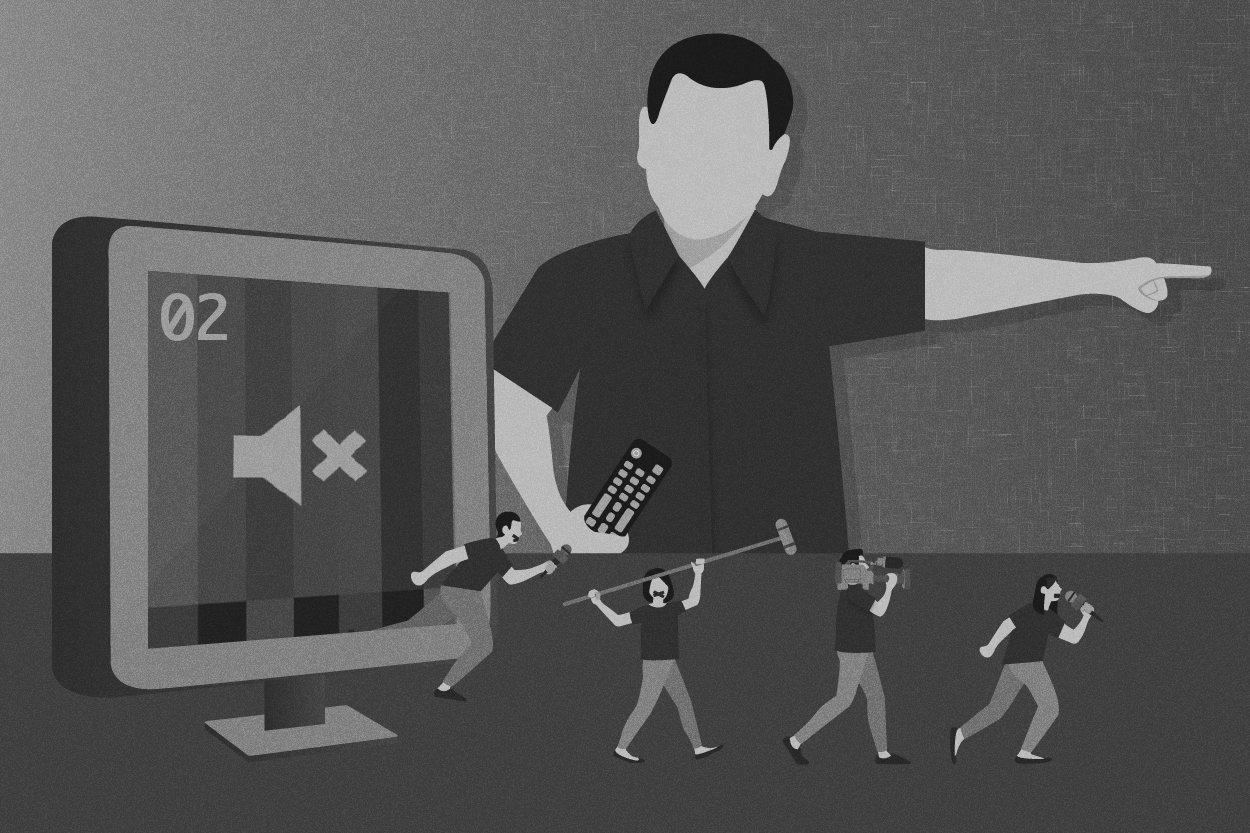EACH FILIPINO is entitled to the right to speak freely without fear of censorship. It is an ingredient that is vital to our democracy, and it would be difficult to live in a world without it. This right allows us to express our views, advocate for causes, and demand for change. However, current events have threatened the free press’ voice and, ultimately, the freedom of ordinary citizens.
The country’s press freedom is under attack once again after Solicitor General Jose Calida filed a quo warranto case against ABS-CBN’s legislative franchise last February 10. In the 63-page petition, Calida accused the network of violating foreign ownership laws and launching Kapamilya Box (KBO) TV pay-per-view channel without permits from the National Telecommunications Commission. The network has since responded by stating that it did not violate the law as it had received the necessary approval for KBO and its other broadcast offerings. It also maintained that the foreign investments they received through Philippine Depositary Receipts (PDRs) were approved by the Securities and Exchange Commission (SEC) and the Philippine Stock Exchange.
This would not be the first time the government has taken shortcuts to oust a perceived enemy. Using arguments similar to Calida’s constitutionally adventurous case against ABS-CBN, the SEC attempted to silence Rappler in 2018 by revoking its registration after alleging that their PDRs from foreign investors violated constitutional laws on ownership. In the same year, former Chief Justice Maria Lourdes Sereno was also ousted via a questionable quo warranto through a bout of legal gymnastics, ultimately resulting in the removal of one of the President’s chief detractors.
The move to discredit ABS-CBN takes a page out of the exact same playbook: In the eyes of the Duterte-faithful, a quo warranto against the almighty ABS-CBN is but the final blow in a long saga against the Chief Executive’s worst critics—all part of a grand crackdown on dissenting voices.
The silencing of the media does not only signify the loss of their freedom—it also means the repression of the Filipino people. If we allow the suppression of the press to continue, we are allowing our right to free speech to be trampled on.
A shared history
Aside from press freedom, the potential shutdown of the country’s largest and oldest media company could cost 11,000 jobs and a key aspect of Filipino culture. Through the years, ABS-CBN has evolved to become more than just a source of news and entertainment. Filipinos have given the network the power to shape how they view, understand, and dream about the world.
ABS-CBN’s establishment dates back to the 1950s, when it was still called the Bolinao Electrics Corporation and given a temporary permit to operate a television station. In the decades that followed, ABS-CBN weathered a shutdown during the Martial Law era, navigated the transition to the Information Age, and changed ownership from the Quirinos to the Lopezes. It can be argued, however, that by being so rooted in the nation’s psyche, ABS-CBN figuratively belongs to the Filipino.
The network has let itself into our lives, and vice versa. Television is at the heart of many Filipino homes, as 60% of our countrymen still get their news from TV. Broadcast remains the best way to reach even Filipinos in rural areas, where digital infrastructure is slow to develop. While there is a gradual shift towards smaller screens, the bigger one in the Filipino family’s living room has always been a tool for learning and bonding. Besides the nightly news, many of us can look back on afternoon game shows, dramatic primetime teleseryes, and educational programs of the Hiraya Manawari (1995-2003) variety—all of which call back to a proudly Pinoy childhood.
Until today, ABS-CBN claims market leadership because Filipino minds have steered its direction, Filipino talents have put it on the map, and Filipino viewers have connected with these stories time and again. Yet, personalities such as Senator Bato dela Rosa dare to claim that the nation has been completely deceived by the likes of ABS-CBN.
This perspective only discredits the citizen as a consumer. ABS-CBN has catered to the Filipino taste and innovated programs to keep up with us. Its vast resources mean our representation, too–the press is about the people it reaches, just as much as the people behind it. ABS-CBN has served as a platform for our stories to be told, and it is this platform that is being threatened into silence.
A call to raise our voices
Now is the time to make our voices heard and speak for those who normally speak for us. We cannot allow the government to spin its own version of the truth while remaining unchecked.
Though we may not have the platforms the mainstream media has, we can use our own voices to protest, campaign online, and spread the word about our disapproval of the case. Whether it’s through taking to the streets or convincing those in your circles to rally for the media’s rights and freedom, we need to use our collective voice to show how we will not stand for these acts of intimidation against the press.
This is not only the media’s fight—it is a battle that may determine whether or not the administration will respect our democratic rights. Who’s to say what may happen if we sit idly as more and more platforms of the free press are taken away? The censorship of the free press may easily snowball into the censorship of every Filipino. Today ABS-CBN, who else tomorrow?







